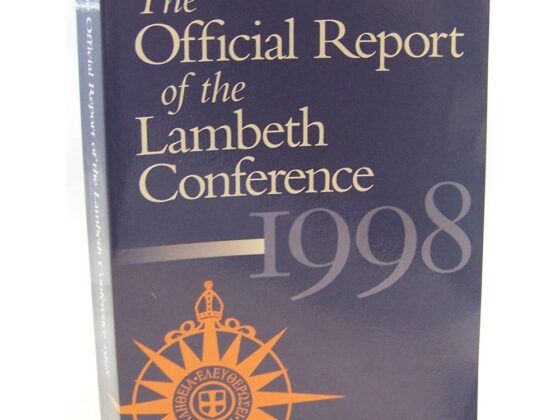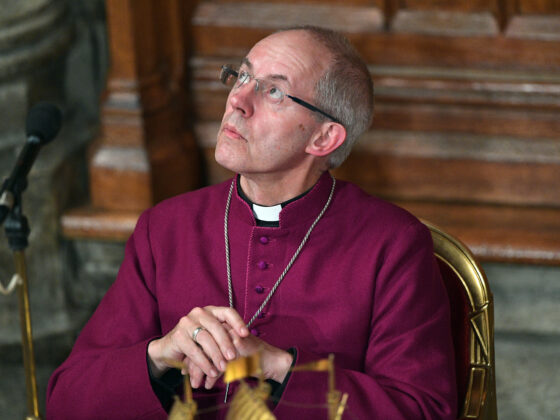There is a riddle at the heart of Martin Luther’s hymn “A Mighty Fortress.” The hymn poses a spiritual battle between God and the Devil (the Deceiver):
The Prince of Darkness grim,
we tremble not for him.
His rage we can endure
For lo! his doom is sure.
One little word shall fell him
What is that “one little word”? For most people, I suspect the answer is Jesus, who is the Word of God Incarnate. Curiously Luther suggested that the little word was “Liar!”
That led me to think of Jesus’ one-word dismissal of the Devil after the wilderness temptations: “Scram, Satan!” (Matthew 4:10). Perhaps both interpretations are correct, since it is Jesus who uttered it. Luther’s sense is this: In spiritual battles, the believer can trust the simple truthfulness of God’s promises in Scripture, which are always “Yes.”
I thought of the simplicity, the clarity of God’s Word in Scripture when I read the following interview which Archbishop Justin Welby gave last week (18 May 2018) concerning the issue of sexuality and marriage:
On the contentious issue of sexuality, he acknowledged changes in his attitude. “Are my views different to 25 years ago? Yes.” Asked if they were different from five years ago, he replied: “I hope they’re deeper. I’ve not changed in the sense that I believe the scriptures, properly interpreted, remain for me the final authority in matters of doctrine, in matters of practice. But the phrase is ‘properly interpreted’.
“Properly interpreted.” What do those words mean? This is where matters get slippery.
Justin Welby came to faith in Evangelical circles, and I suspect he is recalling St. Paul’s charge to Timothy: “Study to shew thyself approved unto God, a workman that needeth not to be ashamed, rightly dividing the word of truth” (2 Timothy 2:15 [KJV]). This charge is repeated by the bishop to ordinands “that by daily reading and weighing of the Scriptures ye may wax riper and stronger in your ministry.”
Clearly Scripture, God’s inspired Word written, must be “read, marked, learned and inwardly digested.” The Jerusalem Declaration puts it this way:
2. We believe the Holy Scriptures of the Old and New Testaments to be the Word of God written and to contain all things necessary for salvation. The Bible is to be translated, read, preached, taught and obeyed in its plain and canonical sense, respectful of the church’s historic and consensual reading.
I have recently likened the plain and canonical sense to a tapestry woven in three strands representing its artistic, didactic, and narrative dimensions. The “wovenness” of these dimensions need not obscure but rather enhances the truth of God’s Word. The Jewish interpreter Meir Sternberg speaks of the Bible “maneuvering from the truth to the whole truth,” which is why the simple believer (“the ploughboy”) and the sophisticated scholar can both grasp its message: “The essentials are made transparent to all comers: the story line, the world order, the value system.”
So let me ask the simple question. Does the Bible not affirm the “two-sexes one flesh” character of human sexuality from start to finish, from Genesis to Revelation?
So God created man in his own image, in the image of God he created him; male and female he created them. (Genesis 1:27)
Therefore shall a man leave his father and his mother, and shall cleave unto his wife: and they shall be one flesh. (Genesis 2:24 KJV)
[Jesus] answered, “Have you not read that he who created them from the beginning made them male and female, and said, ‘Therefore a man shall leave his father and his mother and hold fast to his wife, and the two shall become one flesh’? (Matthew 19:4-5)
“Therefore a man shall leave his father and mother and hold fast to his wife, and the two shall become one flesh.” This mystery is profound, and I am saying that it refers to Christ and the church. However, let each one of you love his wife as himself, and let the wife see that she respects her husband. (Ephesians 5:31-33)
Let us rejoice and exult and give him the glory, for the marriage of the Lamb has come, and his Bride has made herself ready. (Revelation 19:7)
Conversely, can the Bible not be clearer in its judgment on same-sex activity:
You shall not lie with a male as with a woman; it is an abomination. (Leviticus 18:22)
For this reason God gave them up to dishonorable passions. For their women exchanged natural relations for those that are contrary to nature; and the men likewise gave up natural relations with women and were consumed with passion for one another… (Romans 1:26-27)
Or do you not know that the unrighteous will not inherit the kingdom of God? Do not be deceived: neither the sexually immoral, nor idolaters, nor adulterers, nor men who practice homosexuality… (1 Corinthians 6:9)
When the Lambeth bishops affirmed in 1998 that homosexual practice was “incompatible with Scripture,” they were not citing any particular text but this entire fabric of biblical testimony.
So what would make Justin Welby reconsider these texts when “properly interpreted”? It is not difficult to compile a list of scholarly interpreters who have found a way to reimagine human nature To the extent they deal with the Bible, their reinterpretations fall into certain categories.
Cultural Context – It is argued that the cultural contrast of the ancient Near East and the Greco-Roman world is so different that the biblical texts may be set aside or even must be contextualized away.
Trajectory – It is commonly argued that the Bible involves a development of doctrine, with the trajectory bending unfailingly toward modern egalitarianism. The interpreter must extract the nugget of the emergent truth from the dross of antiquated customs.
Scripture is Wrong – The final stage of reinterpretation is simply to say that the biblical authors are wrong, in fact dangerously wrong. Some say that “Science” has proved biblical view of human nature obsolete. Others say that the biblical worldview was “patriarchal” – whatever that means – and must therefore be rejected out of hand
A relevant example of reinterpretation is found in Thomas Breidenthal’s book Christian Households: The Sanctification of Nearness (1997). Breidenthal is a scholar (Ph.D from Oxford) and a bishop in the Episcopal Church whose work has clearly influenced its Task Force on Marriage and the proposals for same-sex marriage.
At first glance, Christian Households appears to be a book about Christian community, a book about “households” as the setting and “nearness” the chief virtue of the Christian life. But this impression is misleading. When we get to chapter 7 we find that the earlier material was all preparatory for framing the big question:
In our explorations so far we have noted a number of moral principles (the disciplines of Christian householding) and sketched out a moral vision (based on the principle of care) that should provide a basis for evaluating same-sex unions as a form of Christian householding. Can such householding be Christian?
The answer to this question should come as no surprise:
I propose, therefore, that it is not only possible to articulate a sexual ethic that regulates the sexual activity of homosexual persons without prohibiting it, but that this ethic will turn out to be exactly the same for homosexual as for heterosexual persons. (page 132)
When Bishop Breidenthal wrote this in 1997, blessing homosexual partnerships was the cause du jour; same-sex marriage was not even legal in the United States at that time. But from the logic of his case, one can see how he and the Episcopal Church have had no problem shifting to authorize same-sex marriage rites and canons.
I mention Breidenthal in particular, because it seems that he and Justin Welby are singing from the same score. In the chapter on “Family” in his most recent book Reimagining Britain, the Archbishop begins by stating: “By family I mean something close to the household… Families are (and always have been) flexible groups, with somewhat elastic boundaries” (page 63). By blurring the biblical norm of husband-wife and parent-child, he opens the door to further redefinitions of marriage which “call for a flexibility of approach” (page 74).
What Archbishop Welby salvages from this welter of households is a set of “values”: community, courage and stability.” (page 69) This is quite similar to Breidenthal’s definition of “familiar disciplines of householding.” Like Breidenthal, he has harsh words for the Victorian “nuclear family.” (p. 72 and76). In any case, the “traditional” nuclear family has been overwhelmed by current trends of singleness, divorce, cohabitation, and same-sex partnerships. Not to worry. Justin Welby can negotiate between tradition and change:
Tradition that is static dies. Tradition [?] that abandons the past in a paradigm shift loses stability. The same applies to the traditions of values, and thus to the importance of embedding our reimagining in what we have been, as well as what we will be. Thus, for example, same-sex marriage builds on the presumption that marriage is stable and lifelong (the rootedness of tradition), while also responding to the massive shift in cultural acceptance with regard to the understanding of human nature and sexual orientation. (page 80)
It strikes me that Archbishop Welby is at about the same point in 2018 that Bishop Breidenthal was at in 1997. He wants the Church to keep one foot on the dock of traditional male-female marriage, while stepping onto the deck of contemporary culture. Bishop Breidenthal is now fully on board with same-sex marriage. Is there any doubt the Archbishop will end up with him?
Let me come back now to my main point. Justin Welby makes no attempt in Reimagining Britain or any of his other writings to engage with the clear Bible texts regarding sexuality and marriage. He is, I think, counting on the Western scholarly guild to come to his aid. And they will. See, for instance, the 700-page Oxford Handbook of Theology, Sexuality, and Gender, with 41 scholars who approach the subject from “a broad spectrum of theology.” When it comes to the Word of God, the message of these scholars fulfills J. V. Langmead Casserley’s comment: “We are confronted with the paradox of a way of studying the Word of God out of which no Word of God ever seems to come.” These are the “proper” interpreters on whom Justin Welby is relying.
“Properly interpreted” are weasel words meant to distract the Church from taking Christ at His word. “Properly interpreted” are the two little words that will fell the Anglican Communion.
For those unwilling to follow down that path, I would commend another word, the word of Jesus: “If you love me, keep my commandments.”





